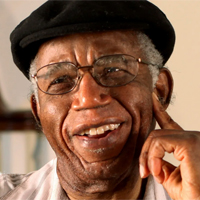 I’ve been reading some of Chinua Achebe’s essays recently and two are particularly pertinent today, despite one being first published in 1965 and the other in 1984. In the first, he considers the role of the novelist as teacher and in the second, the writer in their community. Both raise interesting questions about why we read literature and what the role of literature actually is within society.
I’ve been reading some of Chinua Achebe’s essays recently and two are particularly pertinent today, despite one being first published in 1965 and the other in 1984. In the first, he considers the role of the novelist as teacher and in the second, the writer in their community. Both raise interesting questions about why we read literature and what the role of literature actually is within society.
Achebe’s novels are frequently set for study and he writes amusingly about students’ expectations of what they will learn, and a teacher’s annoyance at lessons he had missed, but her rejects that kind of teaching. What he does support is the idea of literature teaching a history, a culture, an identity. In the second essay he balances the accepted Western idea of the author as an individual voice with the idea in other traditions that art is a community act, to serve and express the identity and concerns of the community rather than an individual artist. His own work, of course, straddles the two ideas, but he argues strongly for art having a social function, rather than being limited to an individual’s self-expression.
Those two essays came to mind when I read this article, in which a number of people talk about their own views on why literature is important. When people may be desperately struggling, when people are losing their lives in violence, what is the point of a book? Ukrainian philosopher Voldymyr Yertmolenko puts it succinctly:
Literature during war is both a blasphemy and a duty.
 A couple of years ago, Alex, then studying his A Levels, recommended Hilary Mantel’s Wolf Hall. The trilogy of books, begun with Wolf Hall. about Henry VIII and Thomas Cromwell sealed Mantel’s reputation as a brilliant novelist shedding illumination on historical events by immersing readers in historical details and fascinating characterisation. Mantel died towards the end of September, aged 70. If you haven’t read her novels, do so, but first read this appreciation of her and her work.
A couple of years ago, Alex, then studying his A Levels, recommended Hilary Mantel’s Wolf Hall. The trilogy of books, begun with Wolf Hall. about Henry VIII and Thomas Cromwell sealed Mantel’s reputation as a brilliant novelist shedding illumination on historical events by immersing readers in historical details and fascinating characterisation. Mantel died towards the end of September, aged 70. If you haven’t read her novels, do so, but first read this appreciation of her and her work.
And in other news, the American satirical website The Onion has weighed in on a court case to defend the rights of satirists, in typical Onion style.